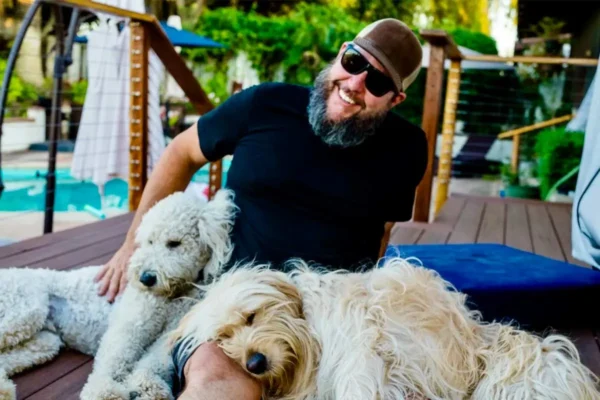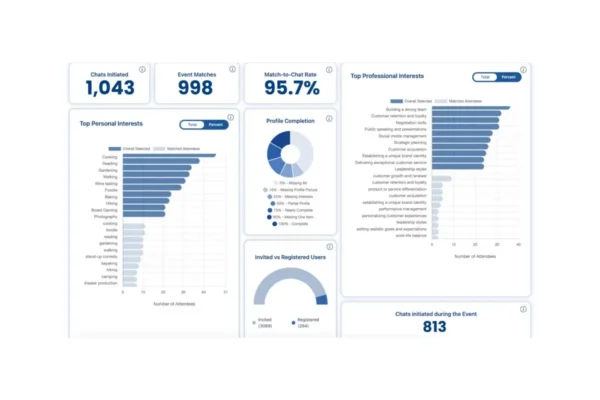Originally written by Brooke Ross
From Georgia to California, it’s happening on nearly every show floor.
Women have discovered the I&D industry, and they’re making a lifelong career of it. From company owner to carpentry apprentice, diversity is emerging in an industry historically dominated by men.
But who are the female faces out there on the show floor involved in backbreaking work, helping to set up and tear down industry events?
While some women are just getting started in I&D, others are already climbing the ladder, walking a path few females have ever traveled in the industry. Some have overcome serious job-related injuries, while others may have felt they had to prove themselves in the eyes of their male colleagues.
Maybe a single mother is hanging a banner above your booth, or a woman familiar with the industry since college employs the crew building your exhibit.
While every woman in the I&D industry has her own story, one trait the following six women share is a love for the work they do every day.
Renee Jones: Demanding – and commanding – respect
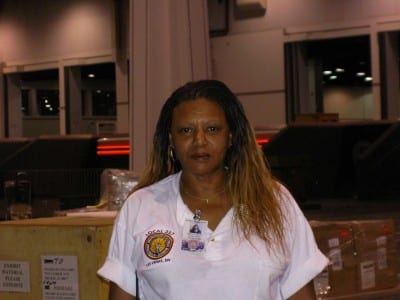
Electrician Renee Jones is unlike any other woman in the I&D industry.
She is the union steward for tradeshows for the International Brotherhood of Electrical Workers Local Union #357, the first female ever selected for the position by the organization’s Las Vegas, Nev. chapter.
Appointed to the job in 2000, Jones acts as a go-between, representing the union label and other electricians. She ensures contracts are enforced and handles jurisdiction issues if exhibitors try to do IBEW’s work.
If an IBEW member is facing discipline, termination or is involved in an accident investigation, Jones, an industry member since 1994, represents the individual when he or she meets with the appropriate authority.
“I’m the sounding board,” she said. “You have to be personable. It’s not always an easy job.”
Jones, a single parent of a 12-year-old daughter, receives no additional compensation for her role as union steward. She accepted the job because she wanted to contribute to the organization that helped her through a difficult period.
During her third year of a five-year apprentice, Jones was seriously injured by a 12,000-volt shock while on a construction job. She endured several internal injuries and third degree burns and was unable to work for one year, although she continued attending apprentice classes.
“When I was out on my injury, my union brothers and sisters took up collections and checked up on me,” she said. “I wanted to give something back.”
Jones juggles serving the union with her full time job as an electrician. Duties for the tradeshows include running power lines, setting up all electrical power outlets for the booths, power distribution and installing lights above the show floor. She has worked for many shows, including MAGIC Marketplace and the National Association of Broadcasters Show.
“I’ve done them all,” she said. “You name them, I’ve done them. I’m always there.”
The electrician/union steward works long hours, sometimes as late as midnight the night before a show opens.
“That’s where it becomes difficult being a single parent,” she said.
Jones said she is one of five regular female electricians currently with IBEW Local Union #357.
“It’s a male-dominated field,” she said. “I’ve had people say to me you should be at home cleaning house, making babies. But I demand my respect.”
When it comes to paychecks, Jones said she’s on equal ground with her male peers.
“It’s exactly the same, what everybody gets paid across the board,” she said. “I do just exactly what those guys do.”
Jones works with no special treatment and faces no physical challenges despite her old injuries.
“It’s a challenging job. It’s a dangerous job,” she said. “But if you’re going to be a female in the construction field, I think the electrical field is one of the better positions.”
Jones was no stranger to the electrical industry growing up in Alaska.
“I grew up in a union IBEW household,” she said.
Her father was an electrical contractor, and her brother a journeyman. Jones worked in other fields before joining the family business, jobs ranging from office manager to working on Alaska pipelines.
“Back then my brother could go to work for my father, but as a daughter it wasn’t something a father wanted,” she said. “I don’t think it was what he had in mind, but he’s alright with my career choice.”
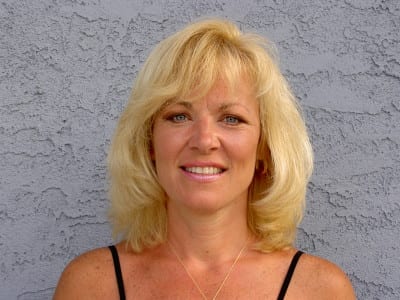
Katie Van Diggelen: Doing whatever it takes to get the job done
“Whatever the job requires I will do,” says Katie Van Diggelen, an account executive with the I&D company, Zenith LaborNet, Inc., at its Chicago, Ill. location.
She takes a confident, matter-of-fact approach to her career and her place in the male-dominated I&D industry. To Van Diggelen, the professional challenges she encounters on a daily basis have nothing to do with being a woman and everything to do with competition that all her peers face, regardless of gender.
“The world has changed. Women are just as powerful as men in the industry,” she said. “Women dot their i’s and cross their t’s.”
She said the real challenge of her job is convincing a potential client she can handle their business better than competitors.
Van Diggelen knew little about the industry in 1981 when she accepted a receptionist/secretary position at a tradeshow company. She climbed through the ranks of the company over 10 years, as her industry experience and knowledge grew. She went on to open and later sell two businesses, a building and fabrication startup, and an I&D company.
She considers her career history her greatest professional accomplishment.
“The exhibit industry is in your blood,” she said. “I love it. I love the people. I love the industry.”
After a period of semi-retirement to be closer to her three teenage children after the death of her husband, Van Diggelen joined Zenith LaborNet three years ago. Today she puts in 60-hour workweeks serving as a liaison between clients and labor, ensuring labor is on the show floor and handling setup details including electricity and carpeting.
Van Diggelen has worked behind the scenes for the World Shoe Association, houseware shows and hardware shows. She embraces the physical demands of the I&D industry, handling tasks that involve ladders, drills and hanging banners.
“I’m on the floor with a baseball cap,” she said. “That’s where you get respect, wearing all the hats of the show floor.”
Van Diggelen said as a woman she’s never been made to feel uncomfortable or unworthy on the job, but she said she asserted herself immediately when she joined the industry.
“Years ago women were considered lower grade,” she said.
According to Van Diggelen, women in the industry had to give three times the effort to prove themselves compared to men. She believes unfair treatment toward women, such as sexual harassment, cannot be tolerated because it’s a reflection of employees’ reputations and the companies that hire them. When it comes to harassers, Van Diggelen said,
“Women just need to smack them.”
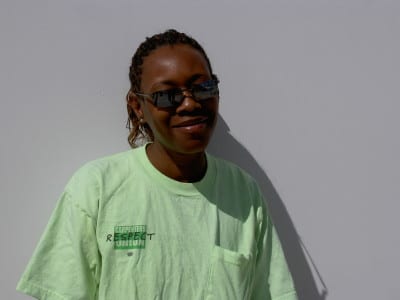
Francine Edwards: You just have to prove yourself
Francine Edwards’ young son brags about his mother.
“My son tells me he wants to be just like me,” Edwards explains. “He tells his little friends, my mom builds things.”
Edwards is one of approximately 180 women in the Southwest Regional Council of Carpenters, a group comprised of about 6,800 members, which represents more than 50,000 carpenters in Southern California, Arizona and Nevada.
Part of the SRCC since November, the single mother of three joined the carpentry industry three years ago. Today Edwards is a carpenter apprentice in Las Vegas, Nev.
“I like working with my hands,” she said. “I always thought carpentry would be hard, but I was going to try.”
Edwards has worked for the Consumer Electronics Show, MAGIC Marketplace and homebuilder tradeshows, to name a few. Her tradeshow duties include building and tear-down and unloading trucks, compared to her construction jobs that are focused around framing and cutting wood.
When it comes to the physical demands of her job, Edwards said climbing up and down ladders carrying heavy equipment is a great challenge, but there is nothing she cannot do.
“A lot of men out there think we (women) are supposed to be in the office,” she said. “Some men are intimidated by women who can do the same thing they can do.”
She said the majority of men she’s encountered in the industry are proud to have female peers, and it’s their support that has kept her in the trade.
Edwards once considered leaving the carpentry industry. She alleges a male colleague sexually harassed her on the job, an incident she said occurred before moving to Nevada. She claims she reported the incident to supervisors but alleges the situation was not addressed.
“I felt like giving up after that,” she said. “But why should I stop something based on one person?”
Edwards said she was laid off from the job a week after filing her complaint.
“Women have it hard out there in the field,” she said. “You just have to prove yourself.”
As a single parent, Edwards faces additional challenges trying to juggle work and home responsibilities. She often spends a great deal of time on her days off cooking meals for the week, so she can quickly reheat food for her children after long days in the field.
Edwards said several of her family members were surprised to hear she was planning to become a carpenter.
“My dad is proud of me,” she said.
Since working as a carpenter apprentice, Edwards said she’s picked up skills that make everyday life easier. When she eventually buys her own home she looks forward to completing many of the refurbishing projects herself.
“Carpentry is a good trade to know,” she said.
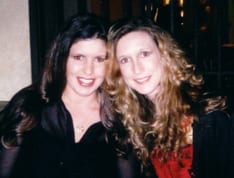
Allison Wolfe & Christi Rogers: Experience, not gender, gets the job done
Business partners Allison Wolfe and Christi Rogers of Raleigh, N.C., employ both male and female workers to handle the I&D sector of their exhibit house.
Capital Display Environments, Inc., a presence in the exhibit industry for more than 10 years, specializes in the design and fabrication of custom exhibits and displays for a range of industries. The staff, headed by CEO Wolfe and CFO Rogers, builds exhibits for tradeshows, theme restaurants and nightclubs, pooling graphics, banner systems and I&D services.
Wolfe said it’s the staff’s experience, regardless of gender, that gets the job done.
“The I&D specialty takes creativity, education and knowledge,” she said. “Those characteristics are not specifically male or female, but individual.”
Four women work for the small company, and three work in I&D, although Wolfe stresses that her staff is a team, and no one employee is limited to a specific focus. She describes the tradeshow business as a time-sensitive industry, where every little detail and professional contribution counts.
“I could not ask for a more ethical and dedicated team,” she said.
Capital Display Environments has worked with the International Textile Market Association, designing and building graphics for the show’s entrances and registration areas. The company recently signed its first international client, an Italian leather company, and handled the client’s I&D needs.
Wolfe believes the number of women in the I&D industry is growing.
“Muscle isn’t the only factor in quality-built tradeshow exhibits,” she said. “It takes skill, patience and knowledge.”
Wolfe joined the exhibit industry in 1994 while attending the School of Communication Arts for Design and Computer Animation in Raleigh.
“My passion for the industry is driven by its constant evolution,” she said. “Each day presents new challenges, so I am continually learning new and exciting aspects of my work.”
When it comes to overcoming challenges as a female in the I&D industry, Wolfe said every person is different.
“It really depends on the individual woman and her mental and physical capabilities,” she said. “If they have it upstairs and can grasp the industry mentally, then a forklift and a cup of coffee don’t present any kind of real challenge.”

Faye Harper: When you enjoy what you do, it doesn’t seem like work
Faye Harper wears many hats for the International Alliance of Theatrical Stage Employees, a labor union with more than 100,000 members in the United States and Canada.
Harper, of Atlanta, Ga., joined the organization as a stagehand in 1991 with nearly a decade of convention industry experience under her belt. Today she juggles many IATSE duties, including a high-ranking, international position that only one woman before her has ever held in the more than 100-year history of the organization.
“I’m a workaholic,” she said. “When you enjoy what you do it really doesn’t seem like work.”
Harper is the second woman in the labor union’s history to serve as an IATSE International Trustee. She was elected to the position in 2000. The three-member Board of Trustees meets semi-annually to review salaries, expenses and the overall financial state of IATSE, the largest labor union in the entertainment industries.
Two years after joining IATSE, Harper was selected as an IATSE international representative in 1993, a support position to the organization’s president.
Harper’s day job is business representative for IATSE Local 834 in Atlanta. She was reelected to the position in 2003, after successfully completing a three-year term in the late 90s. She represents approximately 250-350 workers, both IATSE members and nonmembers, including technicians, artisans and craft persons working for the entertainment and tradeshow events in Atlanta.
“I believe in what we stand for,” she said. “It’s great to get up and go to my job in the morning.”
As business representative, Harper’s duties include negotiating collective bargaining agreements with employers and ensuring safety procedures are in order to protect the workers as they begin a variety of physical tasks, including building exhibit booths for tradeshows.
“I’m enjoying being part of a large family and making sure they [the workers] are treated fairly,” she said.
Unlike many sectors of the I&D industry, Harper estimates about 45 percent of IATSE Local 834 members are female.
A single mother herself, Harper guesses there are so many women in her local union because of the flexibility of the job. As a stagehand, she enjoyed the fact that she could spend more time with her three children.
“Working from show to show, you’re not locked down in a 40-hour week,” she said.
After filling the shoes of a stay-at-home mother for several years without any previous career experience, Harper took a job in 1983 with an employer that serviced the convention industry. She said she jumped into installation duties immediately.
Harper’s children adjusted well to their newly working parent and appreciate how her career has evolved.
“They’re pretty proud,” she said. “They’re very supportive. They understand I have a lot of challenges. What I do has a lot of impact on peoples’ lives.”
[Reprinted from April 2004 issue]












